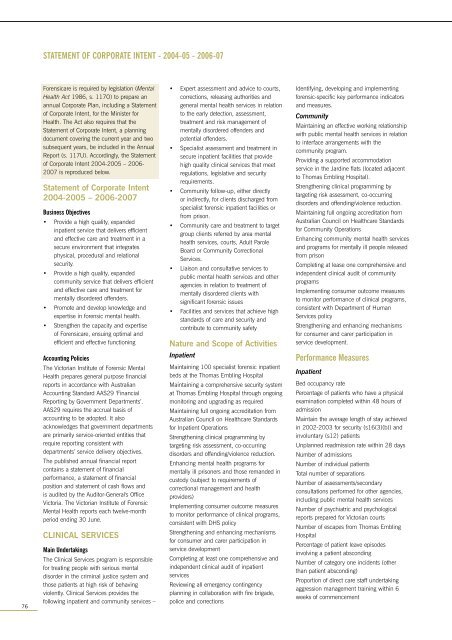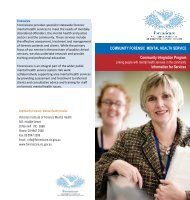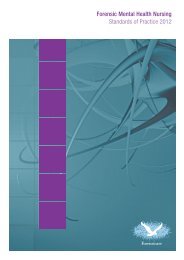Annual Report 2004-2005 - Forensicare
Annual Report 2004-2005 - Forensicare
Annual Report 2004-2005 - Forensicare
Create successful ePaper yourself
Turn your PDF publications into a flip-book with our unique Google optimized e-Paper software.
STATEMENT OF CORPORATE INTENT - <strong>2004</strong>-05 - 2006-07<br />
<strong>Forensicare</strong> is required by legislation (Mental<br />
Health Act 1986, s. 117O) to prepare an<br />
annual Corporate Plan, including a Statement<br />
of Corporate Intent, for the Minister for<br />
Health. The Act also requires that the<br />
Statement of Corporate Intent, a planning<br />
document covering the current year and two<br />
subsequent years, be included in the <strong>Annual</strong><br />
<strong>Report</strong> (s. 117U). Accordingly, the Statement<br />
of Corporate Intent <strong>2004</strong>-<strong>2005</strong> – 2006-<br />
2007 is reproduced below.<br />
Statement of Corporate Intent<br />
<strong>2004</strong>-<strong>2005</strong> – 2006-2007<br />
Business Objectives<br />
• Provide a high quality, expanded<br />
inpatient service that delivers efficient<br />
and effective care and treatment in a<br />
secure environment that integrates<br />
physical, procedural and relational<br />
security.<br />
• Provide a high quality, expanded<br />
community service that delivers efficient<br />
and effective care and treatment for<br />
mentally disordered offenders.<br />
• Promote and develop knowledge and<br />
expertise in forensic mental health.<br />
• Strengthen the capacity and expertise<br />
of <strong>Forensicare</strong>, ensuing optimal and<br />
efficient and effective functioning<br />
• Expert assessment and advice to courts,<br />
corrections, releasing authorities and<br />
general mental health services in relation<br />
to the early detection, assessment,<br />
treatment and risk management of<br />
mentally disordered offenders and<br />
potential offenders.<br />
• Specialist assessment and treatment in<br />
secure inpatient facilities that provide<br />
high quality clinical services that meet<br />
regulations, legislative and security<br />
requirements.<br />
• Community follow-up, either directly<br />
or indirectly, for clients discharged from<br />
specialist forensic inpatient facilities or<br />
from prison.<br />
• Community care and treatment to target<br />
group clients referred by area mental<br />
health services, courts, Adult Parole<br />
Board or Community Correctional<br />
Services.<br />
• Liaison and consultative services to<br />
public mental health services and other<br />
agencies in relation to treatment of<br />
mentally disordered clients with<br />
significant forensic issues<br />
• Facilities and services that achieve high<br />
standards of care and security and<br />
contribute to community safety<br />
Nature and Scope of Activities<br />
Inpatient<br />
Identifying, developing and implementing<br />
forensic-specific key performance indicators<br />
and measures.<br />
Community<br />
Maintaining an effective working relationship<br />
with public mental health services in relation<br />
to interface arrangements with the<br />
community program.<br />
Providing a supported accommodation<br />
service in the Jardine flats (located adjacent<br />
to Thomas Embling Hospital).<br />
Strengthening clinical programming by<br />
targeting risk assessment, co-occurring<br />
disorders and offending/violence reduction.<br />
Maintaining full ongoing accreditation from<br />
Australian Council on Healthcare Standards<br />
for Community Operations<br />
Enhancing community mental health services<br />
and programs for mentally ill people released<br />
from prison<br />
Completing at lease one comprehensive and<br />
independent clinical audit of community<br />
programs<br />
Implementing consumer outcome measures<br />
to monitor performance of clinical programs,<br />
consistent with Department of Human<br />
Services policy<br />
Strengthening and enhancing mechanisms<br />
for consumer and carer participation in<br />
service development.<br />
76<br />
Accounting Policies<br />
The Victorian Institute of Forensic Mental<br />
Health prepares general purpose financial<br />
reports in accordance with Australian<br />
Accounting Standard AAS29 ‘Financial<br />
<strong>Report</strong>ing by Government Departments’.<br />
AAS29 requires the accrual basis of<br />
accounting to be adopted. It also<br />
acknowledges that government departments<br />
are primarily service-oriented entities that<br />
require reporting consistent with<br />
departments’ service delivery objectives.<br />
The published annual financial report<br />
contains a statement of financial<br />
performance, a statement of financial<br />
position and statement of cash flows and<br />
is audited by the Auditor-General's Office<br />
Victoria. The Victorian Institute of Forensic<br />
Mental Health reports each twelve-month<br />
period ending 30 June.<br />
CLINICAL SERVICES<br />
Main Undertakings<br />
The Clinical Services program is responsible<br />
for treating people with serious mental<br />
disorder in the criminal justice system and<br />
those patients at high risk of behaving<br />
violently. Clinical Services provides the<br />
following inpatient and community services –<br />
Maintaining 100 specialist forensic inpatient<br />
beds at the Thomas Embling Hospital<br />
Maintaining a comprehensive security system<br />
at Thomas Embling Hospital through ongoing<br />
monitoring and upgrading as required<br />
Maintaining full ongoing accreditation from<br />
Australian Council on Healthcare Standards<br />
for Inpatient Operations<br />
Strengthening clinical programming by<br />
targeting risk assessment, co-occurring<br />
disorders and offending/violence reduction.<br />
Enhancing mental health programs for<br />
mentally ill prisoners and those remanded in<br />
custody (subject to requirements of<br />
correctional management and health<br />
providers)<br />
Implementing consumer outcome measures<br />
to monitor performance of clinical programs,<br />
consistent with DHS policy<br />
Strengthening and enhancing mechanisms<br />
for consumer and carer participation in<br />
service development<br />
Completing at least one comprehensive and<br />
independent clinical audit of inpatient<br />
services<br />
Reviewing all emergency contingency<br />
planning in collaboration with fire brigade,<br />
police and corrections<br />
Performance Measures<br />
Inpatient<br />
Bed occupancy rate<br />
Percentage of patients who have a physical<br />
examination completed within 48 hours of<br />
admission<br />
Maintain the average length of stay achieved<br />
in 2002-2003 for security (s16(3)(b)) and<br />
involuntary (s12) patients<br />
Unplanned readmission rate within 28 days<br />
Number of admissions<br />
Number of individual patients<br />
Total number of separations<br />
Number of assessments/secondary<br />
consultations performed for other agencies,<br />
including public mental health services<br />
Number of psychiatric and psychological<br />
reports prepared for Victorian courts<br />
Number of escapes from Thomas Embling<br />
Hospital<br />
Percentage of patient leave episodes<br />
involving a patient absconding<br />
Number of category one incidents (other<br />
than patient absconding)<br />
Proportion of direct care staff undertaking<br />
aggression management training within 6<br />
weeks of commencement














